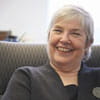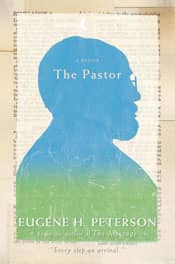 A memoir, especially one from a beloved and influential pastor, is a great gift. The lives and stories of the saints of the Church are replete with both the information and inspiration for those who seek to witness the ways in which a journey of faith can be shaped and look for hope in their own journey. Eugene Peterson's The Pastor: A Memoir provides those amply.
A memoir, especially one from a beloved and influential pastor, is a great gift. The lives and stories of the saints of the Church are replete with both the information and inspiration for those who seek to witness the ways in which a journey of faith can be shaped and look for hope in their own journey. Eugene Peterson's The Pastor: A Memoir provides those amply.
 Eugene Peterson, Presbyterian pastor, seminary professor, and prolific writer has had an influence in the Church that reaches far and wide. Although he is most often identified with the evangelical movements of the Church, his writing, especially his paraphrase of the Bible called The Message, have become resources for reflection and study in churches in all corners of Christendom. The focus of his memoir, however, is his vocation as pastor: its emergence, its formation, its growth, and finally, its integration into his other calls as professor and writer. In that way, he writes of an unusual call to ministry, not one that many others are likely to share.
Eugene Peterson, Presbyterian pastor, seminary professor, and prolific writer has had an influence in the Church that reaches far and wide. Although he is most often identified with the evangelical movements of the Church, his writing, especially his paraphrase of the Bible called The Message, have become resources for reflection and study in churches in all corners of Christendom. The focus of his memoir, however, is his vocation as pastor: its emergence, its formation, its growth, and finally, its integration into his other calls as professor and writer. In that way, he writes of an unusual call to ministry, not one that many others are likely to share.
Peterson is a rare Presbyterian pastor in other ways as well. His beginnings and ongoing connection to Montana locate him in a provenance very different from a more common East Coast Presbyterian established religious milieu. In fact, his faith beginnings were as a Pentecostal, a reality that he celebrates joyfully by calling himself presently "Presbycostal." Whether by personality or by location, Peterson early on takes a path to becoming a pastor that is not quite like the ones most of us grew up with or the ones that seminaries teach folk to take. His tone is in many ways that of a compassionate maverick in the Church.
The insights he brings from that location stand as both vision and challenge to the Church in middle class 21st-century North America. He has published widely and reiterates here the things he considers to be essential for faithful pastoral ministry: stability, committing to stay in one place for the length of the call; sabbath keeping; immersion in scripture; and a company of pastors. In lifting up these practices, there is both hopeful help and systemic critique of the common routine and priority setting of the everyday pastor.
One of his particular skills is his exegesis of his experiences, a kind of lectio divina on the events of his life. He also is a consummate storyteller, who draws the reader into the personality or terrain of the happening, then parses out the teaching or example, after prayerful reflection. His portraits of his mother and father are especially poignant—respectful, candid, colorful, full of love, yet wise to the flaws of each of them. He does not idealize his family of origin or upbringing, but gives it its due, and allows it to speak for itself in the rest of his reflection.
The strongest section of the book is Section III, which he entitles "Shekinah." He speaks again truthfully about the joy and surprise of becoming the pastor of a new church development in Baltimore, Maryland, and of the partnership with his wife. He relates the trepidation and risk-taking, celebrates the community found, rues the disappointments in himself and others. The story of a new church development in the basement of his home, which over time becomes a connected congregation of worship and care, is heartening for the whole Church, especially when denominational statistics reveal so much decline and when pastors struggle to know who to be and how to sustain ministry in the present moment. It is therefore extremely helpful that he parallels this account of the growth of the church with a personal account of his interior journey of discernment that records his own formation and transformation as he lives into what he knows is his calling.
More challenging than the strategies he uses to solve problems of being church to pastors and discerners is the way he unfolds the various avenues in which he continually seeks to know God and God's intent for him. Some of his spiritual practices will seem very familiar to those aware of clergy life. What surprises me is the range of voices he invites in as teachers, conversation partners for him, both actual and literary. He engages with inter-faith friends, listens to theologians and scholars far outside of his traditions or origin. Most importantly, he demonstrates faithfulness to a spiritual rule that supersedes taking care of church business, climbing the ecclesiastical ladder, or growing a big church.




